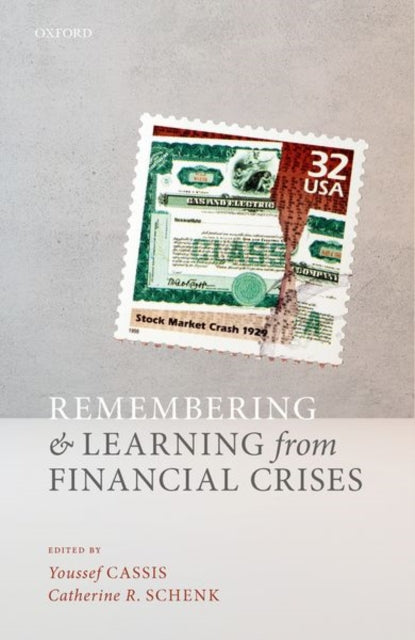Shulph Ink
Remembering and Learning from Financial Crises
Remembering and Learning from Financial Crises
- Condition: Brand new
- UK Delivery times: Usually arrives within 2 - 3 working days
- UK Shipping: Fee starts at £2.39. Subject to product weight & dimension
Bulk ordering. Want 15 or more copies? Get a personalised quote and bigger discounts. Learn more about bulk orders.
Couldn't load pickup availability
- More about Remembering and Learning from Financial Crises
The chapters in this book explore how people remember and learn from past financial crises, and how the past is used by financial institutions to make practical decisions. It recognizes financial crisis as a recurring phenomenon and its impact on public and policy contexts.
Format: Hardback
Length: 240 pages
Publication date: 14 October 2021
Publisher: Oxford University Press
This book delves into the intricate dynamics of human relationships during past financial crises, encompassing a wide range of stakeholders, from the general public to business leaders and policymakers. In the realm of financial crises, three fundamental questions arise: firstly, does society remember these crises, and if so, how? Secondly, have valuable lessons been extracted from past financial crises, and if so, how have they been applied to inform decision-making in the face of new crises? Lastly, has the past been leveraged to guide practical strategies and approaches when confronted with emerging financial challenges? While these questions may seem interconnected, they have been approached from distinct historical perspectives, drawing upon methodologies borrowed from various academic disciplines. Recognizing financial crises as a recurring phenomenon, this book aims to explore the synergies between remembering and learning from financial crises and the role that historical experiences play in shaping the actions of financial institutions. By examining these interconnections, the book seeks to provide a comprehensive understanding of the impact of past financial crises on public and policy contexts.
The chapters in this book offer a comprehensive exploration of the multifaceted relationships that exist between individuals, communities, and financial institutions during past financial crises. From the perspectives of public opinion to business leaders and policymakers, the chapters shed light on the various ways in which these stakeholders have been affected by and have contributed to these crises.
One of the central themes of the book is the question of whether financial crises are remembered and, if so, how. The authors examine various historical events, such as the Great Depression, the global financial crisis of 2008, and more recent crises, to assess the extent to which these crises have been remembered and the lessons that have been drawn from them. They argue that while financial crises may be forgotten or marginalized in the short term, they have long-lasting impacts on individuals, communities, and economies, and it is essential to learn from these experiences to prevent future crises.
Another important aspect of the book is the examination of whether lessons have been learned from past financial crises. The authors argue that while there have been some successes in implementing reforms and regulations to prevent future crises, there are also many examples of failures and missed opportunities. They highlight the need for a comprehensive and coordinated approach to crisis management, including proactive measures to identify and address potential risks, as well as effective communication and coordination between different stakeholders.
The third and final theme of the book is the use of past experiences to inform practical decisions when confronted with a new crisis. The authors argue that while the past cannot predict the future, it can provide valuable insights and lessons that can help policymakers and financial institutions make informed decisions. They discuss the importance of conducting thorough risk assessments, developing contingency plans, and building resilience in financial systems and institutions.
Throughout the book, the authors draw upon a wide range of academic disciplines, including economics, history, psychology, and sociology, to provide a multidisciplinary approach to understanding the relationships between remembering and learning from financial crises. They use case studies, empirical research, and theoretical analysis to support their arguments and provide a rich and nuanced understanding of the complex dynamics that underpin these crises.
In conclusion, Remembering and Learning from Financial Crises is a valuable contribution to the field of financial crisis management. By examining the relationships between remembering and learning from financial crises, the book provides a comprehensive understanding of the impact of these crises on individuals, communities, and economies. It highlights the need for a coordinated and proactive approach to crisis management, as well as the importance of using historical experiences to inform practical decisions in the face of new challenges. The book will be of interest to policymakers, financial institutions, researchers, and anyone else interested in understanding the complex dynamics of financial crises and the role that memory and learning play in shaping our responses to them.
Weight: 492g
Dimension: 163 x 240 x 22 (mm)
ISBN-13: 9780198870906
This item can be found in:
UK and International shipping information
UK and International shipping information
UK Delivery and returns information:
- Delivery within 2 - 3 days when ordering in the UK.
- Shipping fee for UK customers from £2.39. Fully tracked shipping service available.
- Returns policy: Return within 30 days of receipt for full refund.
International deliveries:
Shulph Ink now ships to Australia, Belgium, Canada, France, Germany, Ireland, Italy, India, Luxembourg Saudi Arabia, Singapore, Spain, Netherlands, New Zealand, United Arab Emirates, United States of America.
- Delivery times: within 5 - 10 days for international orders.
- Shipping fee: charges vary for overseas orders. Only tracked services are available for most international orders. Some countries have untracked shipping options.
- Customs charges: If ordering to addresses outside the United Kingdom, you may or may not incur additional customs and duties fees during local delivery.


